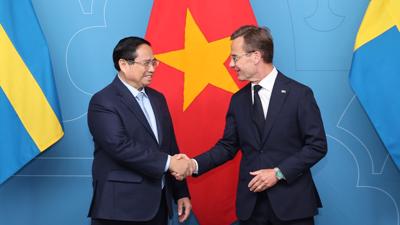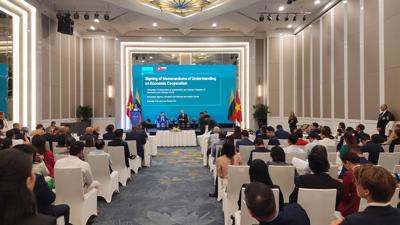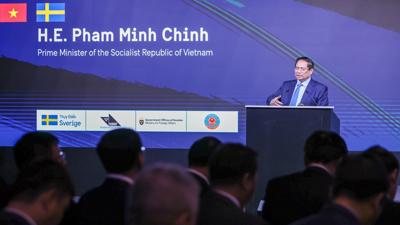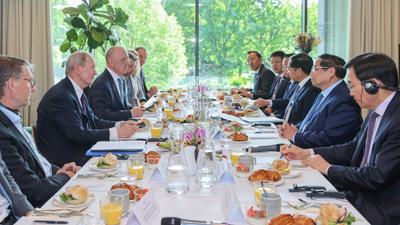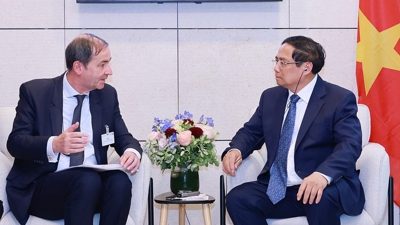Vietnam – Mongolia ties upgraded to comprehensive partnership
At the end of their talks on September 30, top leaders of the two countries issued a joint statement on establishing the Vietnam-Mongolia comprehensive partnership.
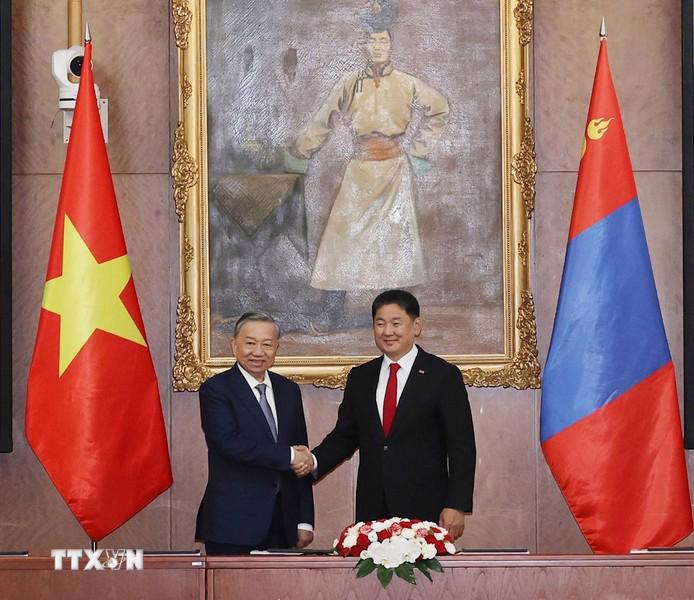
At their talks in Ulaanbaatar on September 30, visiting Party General Secretary and State President To Lam and Mongolian President Ukhnaagiin Khurelsukh reached a consensus on major directions and specific measures to realize high-level agreements, with national defense-security cooperation identified as a key pillar, thus contributing to elevating bilateral ties to a level that matches the new partnership framework, and reflects the global and regional context.
President Khurelsukh said that Mongolia treasures its relationship with Vietnam and considers it one of its key strategic partners in the region. He praised Vietnam’s flexible and balanced foreign policy of multilateralism and diversification of ties, and highlighted Mr. Lam’s historic visit as a significant contribution to bilateral ties.
The Mongolian leader expressed gratitude to the State and people of Vietnam for their support of $500,000 to help Mongolia recover from recent natural disasters. He noted that the Inter-Governmental Commission will meet in Hanoi this November to discuss ways to realize the Vietnam-Mongolia joint statement on establishing the comprehensive partnership.
The two leaders agreed to facilitate the exchange of delegations at all levels, effectively carry out existing cooperation and dialogue mechanisms, and further bolster collaboration in diplomacy, national defense-security, and judicial affairs. Additionally, they vowed to increase coordination in combating trans-national crime and engaging in the United Nations peacekeeping operations, while continuing to support the development of cavalry, a symbol of the Vietnam-Mongolia relationship.
They pledged to boost substantive and effective economic cooperation that aligns with the need of each side, maintain bilateral economic cooperation mechanisms, and enhance trade promotion measures to connect businesses, thereby contributing to lifting two-way trade volume. They committed to supporting information, mechanisms, and policies to promote the export-import of goods and services, ensuring that each country can easily access the other's market, especially for key products.
The two leaders also made a commitment to bilateral cooperation in fostering hi-tech research and development, digital technology, innovation, artificial intelligence, information and communication technology, climate change adaptation, mining and animal farming.
The two sides will work together to identify solutions to overcome challenges in logistics transport and share experience to effectively implement existing cooperation agreements in the fields of road, rail, maritime and air transport.
Both sides vowed to continue building mechanisms for the exchange of experts, lecturers and students, share experience regarding education mechanisms and policies, and digital application in education.
They will increase the implementation of culture-art-tourism promotion programs, facilitate locality-to-locality and people-to-people exchanges, and work closely together to protect citizens from each country who are living, studying and working in the other country.
On global and regional issues, the two leaders concurred to continue to enhance close cooperation and regularly discuss political and security issues of shared concern, offer mutual support at global and regional frameworks and forums of which the two countries are members, such as the United Nations, the Asia-Europe Meeting (ASEM), the World Trade Organization (WTO), and the ASEAN Regional Forum (ARF).
The two leaders underscored the importance of ensuring peace, security, safety and freedom of navigation and overflight in the East Sea, maintaining an environment of peace and stability, upholding the rule of law and settling disputes at sea through peaceful means, ensuring the legitimate rights and interests of nations in accordance with international law, including the 1982 United Nations Convention on the Law of the Sea (UNCLOS).
Concluding their talks, the two leaders issued a joint statement on establishing the Vietnam-Mongolia comprehensive partnership to guide the deep, reliable cooperation between the two countries across all areas, ensuring that their collaboration is substantive, effective and comprehensive.
They also witnessed the signing of seven cooperation documents between various ministries, agencies and localities of both countries.


